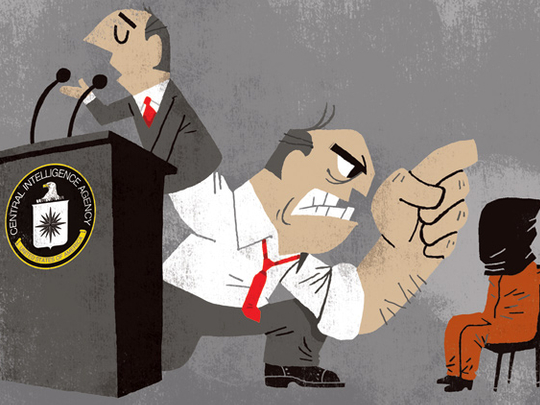
The CIA is on a “charm offensive”.
In June, it opened a Twitter account. (Its first tweet? ‘We can neither confirm nor deny that this is our first tweet’.) Later that month, it held its first public conference, at Georgetown University. On a full day of panels, David Sanger of the New York Times and I were the only speakers without direct ties to the intelligence community. Still, it was a small indication that the CIA was willing to speak about its activities in public, if only in the vaguest terms, and if only to an audience overwhelmingly made up of the intelligence community.
Last Saturday, the Times reported that CIA Director John Brennan is working with former director George Tenet and other high-level current and former CIA officers on a public relations strategy for the impending release of a damning report from the Senate Select Committee on Intelligence on the CIA’s use of “enhanced interrogation techniques” on Al Qaida suspects. The report is undergoing declassification review by the administration right now, but significant parts of it are expected to be released as early as next month.
If the leaks are to be believed, the report will condemn the agency for inflicting torture and cruel treatment on detainees and for lying about the programme to Congress and the public. If you were facing the public release of such findings, you, too, would be figuring out a response. But torture is not a public relations problem. It is a grave human rights abuse and a war crime. Under the Convention Against Torture, a multilateral treaty that we helped draft and have signed and ratified, a nation’s obligation when confronted with credible claims of torture is not to devise a public relations counteroffensive, but to refer the matter for criminal investigation and possible prosecution.
The CIA’s response is about 10 years too late. The time to respond to allegations of torture, cruelty and disappearances is when they occur, not a decade later, when an official report finds fault. And when you learn such conduct is occurring, there is only one proper response — order it to stop and hold the perpetrators accountable. Both the Geneva and the torture conventions absolutely prohibit torture and cruel treatment of wartime detainees; the world has proclaimed through these laws that there are no circumstances that justify such acts.
However, the CIA, far from halting the practice, continued it as long as it could. The programme began in 2002. When the initial Justice Department legal memo authorising the programme was leaked in June 2004, the George W. Bush administration officially rescinded it. But officials substituted a series of other memos, many secret, that continued to give the CIA a green light. The administration did not transfer its disappeared detainees from the CIA’s secret prisons until 2006, after the Supreme Court had confirmed that the Geneva Conventions apply to Al Qaida detainees and Congress had confirmed that the ban on cruel, inhuman and degrading treatment applies to everyone in our custody, no matter what their nationality or where they are held.
So what will the public relations strategy look like now? One can probably make some educated guesses, based on past assertions by the Bush administration officials. “We didn’t think it was torture because the lawyers told us it wasn’t.” That defence does not work for mafia dons and ought not to work for the CIA. The practices involved — waterboarding, excruciating stress positions, slamming suspects into walls and prolonged sleep deprivation — plainly qualify as torture and have long been treated as such by the US when other nations employ them. Just last week, the European Court of Human Rights held Poland responsible for complicity in the CIA’s crimes, finding that the conduct was so clearly illegal that Poland had an obligation to stop permitting it on its territory.
Poland, in other words, was an accessory to the crime, but the US was the ringleader. Well, if “the lawyers said we could” won’t cut it, how about: “We saved lives”? No one has yet pointed in any convincing way to a case in which the torture programme saved lives. The Senate committee reportedly found no evidence to support that claim. And, of course, the ultimate question is whether any information extracted via torture could have been obtained through lawful means. Ali Soufan, the FBI’s lead interrogator of high-level Al Qaida suspects, says he got more information from his targets using traditional, lawful techniques of building rapport than the CIA did using physical force and pain. In fact, he maintains, the CIA’s infliction of pain obstructed interrogations that were proceeding fruitfully until the CIA got involved.
The question is not whether torture reveals useful information; one can concede that in some circumstances it might. The question is whether the ends justify the means. There are always other ways to obtain useful information. And there are moral limits to what human beings should do, regardless of its “utility” in a specific case. Torturing a suspect’s child in front of him may produce useful information, but it does not justify the act. I am not a public relations expert, but I have some advice for the CIA. There is only one appropriate response to a report finding that the agency inflicted unspeakable and illegal cruelty upon human beings in its custody. Acknowledge that the agency did wrong, issue a formal apology, and, where appropriate, pay reparations. No amount of spin will solve this problem.
— Washington Post
David Cole teaches constitutional law, national security and criminal justice at Georgetown University Law Centre. He is also the legal affairs correspondent for the Nation, and a regular contributor to the New York Review of Books.









